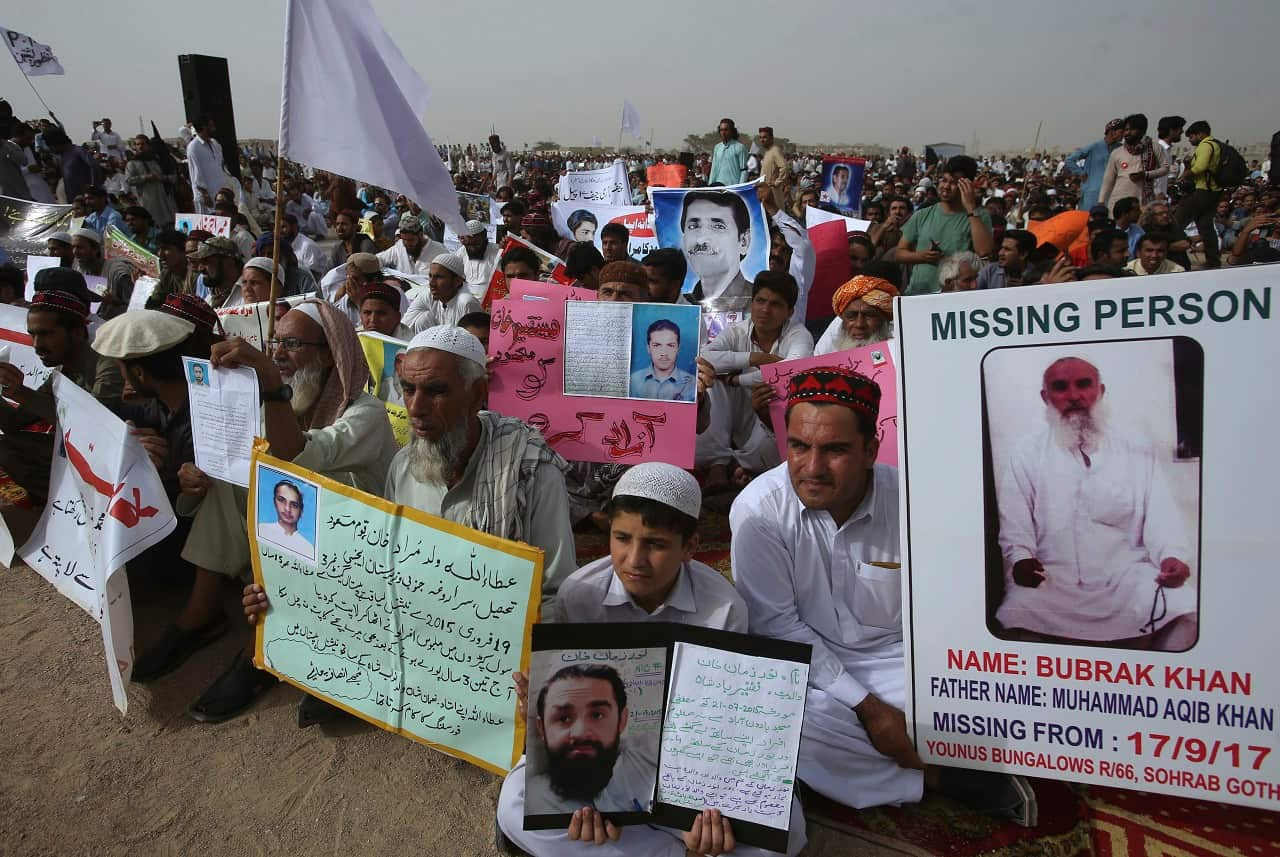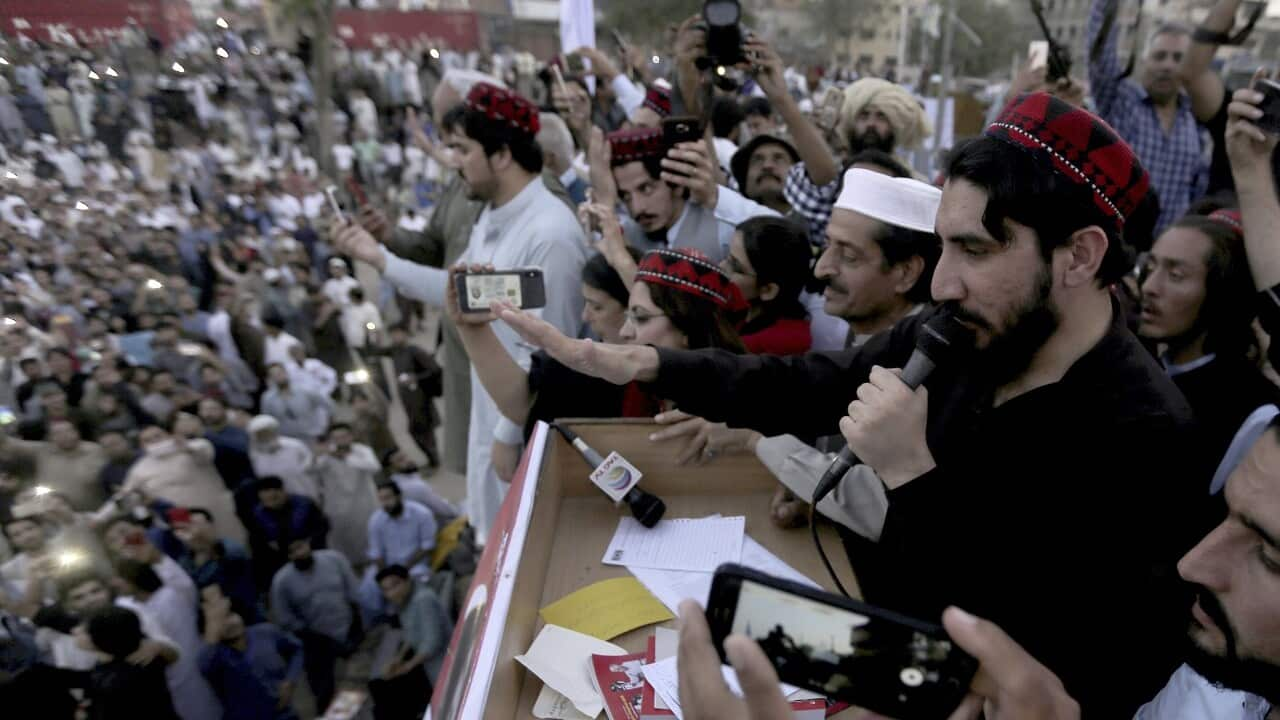The Pashtun ethnic minority in Pakistan has not only faced war and conflict for over seven decades but also military operations in the Pashtun majority areas, abductions, suicide blasts, targeting killings and drone strikes by the US government. According to the Heinrich Boll Stiftung Foundation in Germany, 70 per cent of those killed in the fight against Taliban militants across the country are Pashtuns.
Since 2001, around 30 to 35 million Pashtuns in Afghanistan and Pakistan are thought to have been affected by America’s "war on terror".
As of last week, two suicide bombs at an election campaign each in the north-western province of Khyber-Pakhtunkhwa and the south-western province of Balochistan left over 150 people killed and hundreds injured.
Amidst all this, in 2014 a young man named Manzoor Ahmad Pashteen launched the Pashtun Tahafuz Movement (PTM) - which means the movement for the protection of the Pashtun - to raise voice against the atrocities faced by the Pashtun minority. Pashteen says this is a Pashtun genocide, which needs to stop. He has, since then, faced State and military opposition and huge criticism from certain factions in the country that accuse him of being an agent of the “enemy” states, provoking anti-Pakistan sentiments and receiving foreign funding, mainly from Afghanistan.
“The Pakistani Army has received $33 billion to kill us and fund war and conflict in the country,” Manzoor Pashteen
Despite this, hundreds of thousands of Pashtuns and those supporting his cause have taken to the roads and social media across Pakistan, demonstrating peacefully for the rights and safety of the Pashtun people.
The director general (DG) of the Pakistani Inter-Services Public Relations (ISPR) Maj Gen Asif Ghafoor, however, believes these people are being misled and exploited by “inimical” forces that are not only brainwashing these young group of people, but also funding their movement to lock horns with the State and the establishment.
To listen to Pashteen's talk with SBS Urdu, click on the audio link below.
PTM and foreign funding
In an interview with SBS Urdu, Pashteen refused to have ever received any foreign funding, personally or for the movement. He said the party ran on charity received from people. The media, he said, never covered PTM’s protests to have noticed charity boxes on the spot.
“If they [media] cover our protests and other gatherings, they will see that we place many charity boxes at our events [and offices]. Most of the times, these boxes are full of charity donated by our followers.”
Pashteen, however, accused the Pakistani Army of receiving funds to fuel conflict and unrest on the country and kill Pashtuns.
“We now have enough evidence that proves that inimical forces are behind PTM and exploiting them": DG ISPR
“They received $33 billion to kill us and fund war and conflict in the country,” he said.
He said instead of these blame games and attempts to portray the Pashtuns as bad people, the State, and the establishment should help solve their problems.
At a recent press conference, Maj Gen Asif Ghafoor said that he had personally met with Pashteen and Mohsin Dawar, one of PTM’s most senior workers. He said they put forward their problems, including Watan Cards, check-posts and unexploded ordinance in their area; and they were assured that all their legitimate concerns will be addressed. The DG also told the media that after the meeting, he had received a text message from Dawar thanking him and the Services for their support.
“All their problems were solved. I wonder what happened then,” he said.
Referring to PTM and its support from the Afghan government and the people, The DG said red flags were to be raised when “anti and non-state actors start to support a campaign in a country.”
However, he said, PTM had not once been dealt with force.
“The Army Chief had given special orders not to arrest them since they are equal citizens of the country,” however, “we now have enough evidence that proves that inimical forces are behind them and exploiting them.”
PTM – an apolitical movement?
During the interview, Pashteen maintained PTM's apolitical standing, saying the party was not made for a political purpose.
He said he believed that he did not need to join the country’s politics to raise voice and fight for the rights of the Pashtuns. This, he said, was a continuous struggle.
A week after this interview, Pashteen cancelled the membership of eight PTM members after they submitted their candidacy papers to run for office in the country’s upcoming elections on 25 July. Pashteen says they will be accepted back into the party after the elections, given that they do not win the seats and join politics. There has been no conflict about this or any other issue among the party members, he says.
The ISPR DG, on the other hand, says the party has had multiple conflicts within. At one of these instances, there was crossfire between some members of the party, when they had all been invited by the Aman Committee (peace committee), resulting in several casualties. The DG says the Army and FC personnel had to intervene to facilitate negotiations.

A threat to freedom of speech
Of the many causes Pashteen advocates, freedom of speech is one. During his interview, he expressed his concerns over the state and establishment’s control of speech and the press, and the “failure” of Pakistani media to report the utter truth. He said Pakistani media were mere propagandists, who were extremely biased and under control by the State and establishment.
“They have never given us coverage. We have always had to use the social media to get our message and demands through to the public,” he said.
The ISPR DG, however, said that false stories and fake news against the Pakistani Army were being spread on social media to create propaganda against the armed forces. This, he said, and any anti-state movement must not receive media coverage. At the press conference, he thanked the Pakistani media for ignoring PTM’s campaign and not giving it any coverage.
Freedom of speech has become one of the most concerning issues in contemporary politics. Despite being a right under the Constitution of Pakistan, journalists, writers, intellectuals and rights activists continue to face political and religious policing. In some cases, the State and the country’s Army have been accused of threatening writers and intellectuals and facilitating their abductions.
Since PTM’s launch and demonstrations, a number of talks by progressive academics and speakers at various universities in the country were cancelled, some academics lost their jobs, and students were prohibited from wearing the red and black cap that became a PTM’s symbol. Many PTM workers were also arrested, most of who were later released. The attack on freedom of speech, and consequently some writers, also led to many prominent journalists and bloggers seeking asylum in foreign countries.
At the press conference, the major general also expressed his concerns about Manzoor Ahmad getting the name “Pashteen” (not his official last name), a sudden social and foreign media backing of the movement, and hundreds of thousands of caps imported into Pakistan that later become the symbol of PTM.
He said, “At least 5,000 social media accounts had been made in Afghanistan for/by PTM in one day, and people had suddenly started organizing anti-Pakistan protests all over the world.”
State within a State
Pashteen believes the establishment has created a State within the State.
“It is a fight between constitutional and unconstitutional measures and actions. When you reject the writ of the Constitution, you are creating a State within the State; and they [authorities] have done it totally surpassing the Constitution,” he said.
He said the authorities had been harassing people in many ways and defying the rule of law. For instance the Rangers in Karachi and Punjab Police, he said, would stop random people and snatch their mobile phones if they liked them. He said this had happened to him and many of his comrades several times.
“People who have a sense of what is at stake are supporting PTM,” he said, adding that the rest who considered questioning the State and the establishment blasphemous were those whose minds had been stamped and brainwashed.
“We will sit quietly inside our homes if our demands are met and the Pashtun people are [finally] given their rights and safety they deserve as equal citizens of the country.”
‘Great change is happening in Pakistan’s tribal areas’
Dr Shabir Hussain is an Assistant Professor at the International Islamic University’s Media and Communication Department. He specializes in peace and conflict and believes that PTM must press their demands through a strategic and pragmatic way, and avoid taking extreme positions.
Talking to SBS Urdu from Islamabad, he said there was no doubt that PTM had given voice to the voiceless who had been suffering at the hands of the Taliban, and in some cases the Pakistan Army, for years.
“PTM is just a reaction to these injustices,” he said, adding that it symbolised a new face of tribesmen, who were educated, believed in democracy and were aware of their rights.
Dr Hussain believes a great change is happening in Pakistan’s tribal areas.
He said these people were misguided by the Pakistani establishment in 1948 to fight a war against India, and then the second generation was used in the Afghan jihad. The third generation, he said, cannot be easily fooled.
“PTM has been labeled as a threat to national security and many people in mainland Pakistan have been made to believe this.”
“Instead of focusing on their immediate issues, they have pointed to the systemic and policy-based issues and fiercely criticised the Army; and the Army in Pakistan does not tolerate criticism - even for its mistakes and blunders.”
He also mentioned the list of "critical journalists”, prepared and circulated by the Pakistan Army as a way to silence outspoken people who believed in freedom of speech and had been writing about these atrocities.
When asked about media’s [choice of] coverage of PTM and their protests, he said there had been a complete blackout in all state and private media.
“The military-sponsored media have framed PTM as a foreign-funded group. The securitized and militarised milieu vitiated by the military is a good platform for the army to label anyone anti-Pakistan and persuade millions of gullible populace,” he said.
He said, “Punjab-based media” was another threat to freedom of press across the country and ignored issues in other provinces.
This, he said, did not mean that PTM had not made any mistakes. They had digressed a couple of times.
“Instead of focusing on their immediate issues, they have pointed to the systemic and policy-based issues and fiercely criticised the Army; and the Army in Pakistan does not tolerate criticism - even for its mistakes and blunders.”
"PTM is a reaction to these injustices. It symbolizes a new face of tribesmen, who are educated, believe in democracy and are aware of their rights."
He said there were three main reasons for all the State, military, media and [some] public criticism of PTM – “Firstly they have been criticising the military. Then they are seen as ethnocentric Pashtuns, and finally, they are tribal people standing up to challenge the narrative on terror policy.”
With all this, he said, he did not see the State, military or the media favouring PTM or similar movements in the near future.
